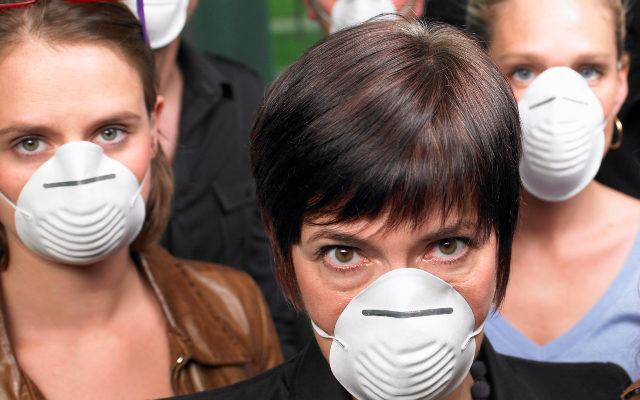No, Businesses Do Not Have To Allow You to be Mask Free On Their Property Because of a Disability

Recently we’ve seen a few items making their way around social media regarding mask exceptions under the Americans With Disabilities Act – or the ADA.
These posts essentially say that a store can not prohibit you from entering if you don’t wear a mask if you have a health issue that prohibits you from wearing one. This is a popular one:
Face mask exception cards,enjoy:) pic.twitter.com/sMxCO1VZPg
— Jeffrey s borreson (@jeffreymadwisc) June 27, 2020
Oh, and don’t forget the latest anti-mask tirade from this unfortunately misinformed woman in California:
“I have a breathing problem!” unhinged but physically fit Karen screams at top of her lungs as she’s escorted out of a Trader Joe’s in Los Angeles for refusing to wear a mask pic.twitter.com/Izm8j56iGG
— Borzou Daragahi 🖊🗒 (@borzou) June 27, 2020
The fact is, there is no such ADA exception from wearing a face mask.
Don’t believe me? Here’s the Department of Justice weighing in on those 100% bogus “face mask exception cards” floating around. It reads:
COVID-19 ALERT
*COVID-19 ALERT: Fraudulent Facemask Flyers*
The Department of Justice has been made aware of postings or flyers on the internet regarding the Americans with Disabilities Act (ADA) and the use of face masks due to the COVID-19 pandemic, many of which include the Department of Justice’s seal.
These postings were not issued by the Department and are not endorsed by the Department.
The Department urges the public not to rely on the information contained in these postings and to visit ADA.gov for ADA information issued by the Department.
For more information and technical assistance about the ADA, please contact the ADA Information Line at 800-514-0301 (voice) and 800-514-0383 (TTY).
So, if those are not real and completely fabricated, what DO business have to do to cater to those who can or should not be wearing facial coverings?
ADASoutheast.org has a great webpage explaining the ins and outs. There is a lot to dig in to, but here’s the gist:
First, business do NOT have to allow you in to their stores without a mask because you can not wear a mask, but they DO need to make “reasonable modifications” which include:
Examples of reasonable modifications to a face mask policy
-
Allow a person to wear a scarf, loose face covering, or full face shield instead of a face mask;
-
Allow customers to order online with curbside pick-up or no contact delivery in a timely manner;
-
Allow customers to order by phone with curb-side pick-up or no contact delivery in a timely manner;
-
Allow a person to wait in a car for an appointment and enter the building when called or texted; or
-
Offer appointments by telephone or video calls.
In regards to Angry Allison at the North Hollywood Trader Joes, she could have easily worn a face shield or had her order ready for curb-side pick up.
Oh, and that bit about a business not being allowed to ask for proof of a disability appears to be incorrect as well:
How should I respond to a request for a reasonable modification to the face mask policy?
The U.S. Department of Justice issued two settlement agreements that provide guidance on the reasonable modification decision-making process.[23][24]
-
Choose at least one person, and a back-up, who are authorized to receive and review requests for reasonable modifications. The decision-maker for a state or local government agency is the head of the public agency or his/her designee.[25]
-
After receiving a request for a reasonable modification, talk with the individual with a disability to learn why the person needs to modify the face mask policy and to find a solution that meets ADA requirements. Decisions about reasonable modifications should be made in a timely manner.
-
After the discussion, the government agency or private business may:
-
Agree to the request.
-
Ask for medical documentation about the person’s disability that is necessary to:
- Verify that the individual meets the ADA definition of disability (i.e., has a physical or mental impairment that substantially limits one or more major life activities); or
- Describe the needed modification; or
- Show the relationship between the individual’s disability and the need for the requested modification.
It is important to remember that if a person’s disability is obvious, information about the disability should not be requested unless it is necessary to evaluate the disability-related need for the modification. In most cases, an individual’s medical records or detailed information about the nature of an individual’s disability are not necessary for this inquiry.
-
Deny the request. If a request for modification is denied, a state or local government agency must provide a written statement as to why the request was denied. Private businesses are also encouraged to document the reason for denying a request for reasonable modification, provide a copy to the person with a disability, and keep a copy on file.
-
Bottom line, whether you think the mask rule is for the safety of our society or an affront to your freedoms, you have to wear it if the story demands it.






